Mighty Networks is a highly popular community management platform.
It was one of the earliest platforms of its kind.
But lately it has lost of its charm.
Why?
It has many downsides.
Like:
- It has poor user interface and experience.
- It has only basic gamification features
- Only has daily digest options (no weekly digest feature), you end up spamming the user inbox.
- It has only Stripe integration for payments
- It doesn’t have native integrations with any apps except Zapier!
- It lacks community moderation tools like spam prevention, keyword blocking, profanity checkers, post blocking, etc. (good luck managing public/large communities)
When looking at the feature requests made by users over the years, it becomes evident that the founders are not addressing the real-life problems that people face while using Mighty Networks.
Fortunately for you, now there are various alternatives to Mighty Networks that you can use to host your communities.
In a hurry?
Here are our top 5 picks (narrowed down)
| Product name | Starting price | Courses feature |
| Circle – Most popular alternative | $89 per month | Yes |
| Kajabi Communities – All-in-one marketing platform | $179 per month | Yes |
| Heartbeat – Affordable alternative | $49 per month | Yes |
| Passion.io – LMS app builder for coaches | $119 per month | Yes |
| Podia – Affordable all-in-one platform | $39 per month | Yes |
Looking for more alternatives?
Let’s dive in.
Circle.so – Most popular Mighty Networks alternative

Circle is a strong competitor to Mighty Networks, and I have high conviction in this platform.
It is backed by the former team of Teachable and has substantial funding.
What sets Circle apart is its focus on automation workflows and user engagement, following the footsteps of successful startups like Slack and Notion. I find this aspect particularly fascinating.
Key features:
- Spaces (channels)
- Direct messaging
- Group chat rooms
- Event spaces
- Private messaging
- Weekly digests for summarizing weekly activities
- Livestreams
- Use of a custom domain
- Ability to embed Circle Spaces in your website
You can learn more about Circle and its features here.
Circle’s pricing starts at $89/mo, which lets you host unlimited members.
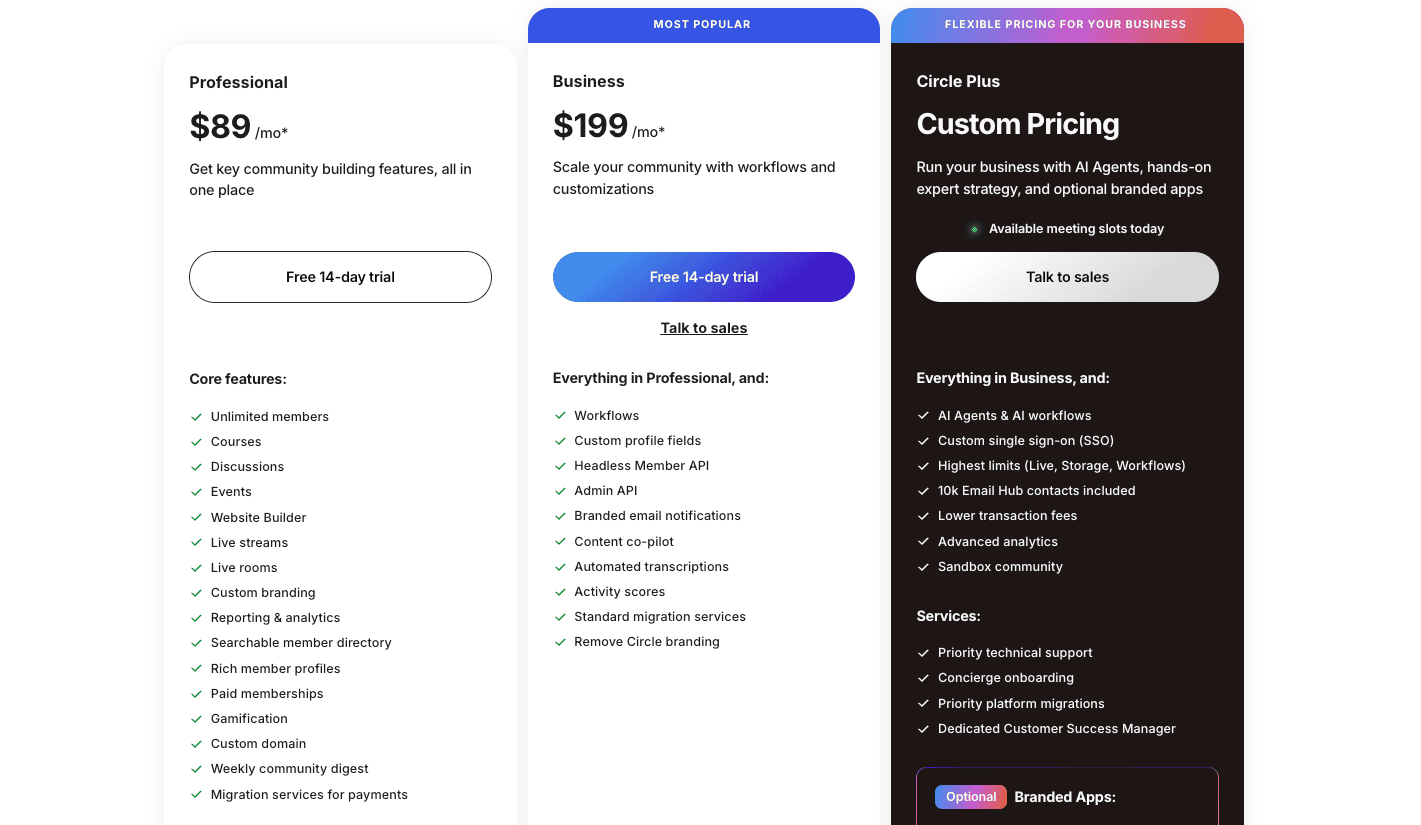
For most people, this plan works great, but it doesn’t include automation workflows. You’ll need to upgrade to their business plan at $199/mo to get those features.
Things to watch out for:
- All their plans are billed annually (look for the asterisk * in the pricing)
- They don’t show the transaction fee on their pricing page
- They don’t clearly mention how many workflows you actually get with their Business plan.
Pros 👍
- Intuitive UI/UX: Circle provides an intuitive user interface and user experience, making it easy for users to navigate and engage with the platform.
- Automation workflows: Circle offers automation workflows that enhance community engagement and efficient management, similar to having Zapier for community management.
- Community moderation tools: Includes community moderation tools such as keyword blocklists and the ability to flag comments and posts, helping to prevent spam and maintain a healthy community environment.
- Built-in live-streaming: It has a built-in live-streaming feature and recently introduced live spaces, allowing you to go live within specific groups or spaces and engage with your community in real-time.
- Community AI: Circle now offers Community AI for Business Plan customers. This feature enhances content creation, improves member connections with activity scores, provides automated video transcriptions, and includes a Circle Bot 🤖 for quick resource finding.
Cons 👎
- Basic course component: Circle’s course component lacks advanced LMS features like course completion certificates, course compliance features, graded quizzes & assessments, video analytics, heatmaps, etc. If these features are important for you, you may need to go with dedicated course platforms.
- Limited marketing features: Unfortunately, Circle doesn’t offer marketing features like email marketing and sales funnels. You’ll need to use other tools like Kajabi (that also has really robust community feature).
- Not completely white labeled apps: Circle’s apps are not completely white labeled like Mighty Networks. While you can remove the branding, you don’t have any control over designing the apps, listing them on Play Stores, or maintaining them.
I have reviewed Circle in depth in one of my previous blog posts. If you are interested you can read my review on Circle.
Interested in knowing more about how Circle compares to Mighty Networks? Do refer this blog post instead.
👉 Bottom line: Circle’s got the best UI and automation tools, but their course features are basic. You’ll pay premium prices and need other tools for marketing.
Kajabi – All-in-one alternative

Kajabi is an all-in-one digital selling platform that comes with various features like courses, communities, coaching, podcasts, webinars, automation workflows, and even email marketing functionality.
All of their features work in tight integration with each other, giving you a streamlined experience, and you don’t need to use multiple siloed apps and glue them together with Zapier or other API integrations.
Kajabi traditionally had very basic community component, but ever since they acquired Vibely, they completely rebuilt their community feature from the ground up to include a lot of features.
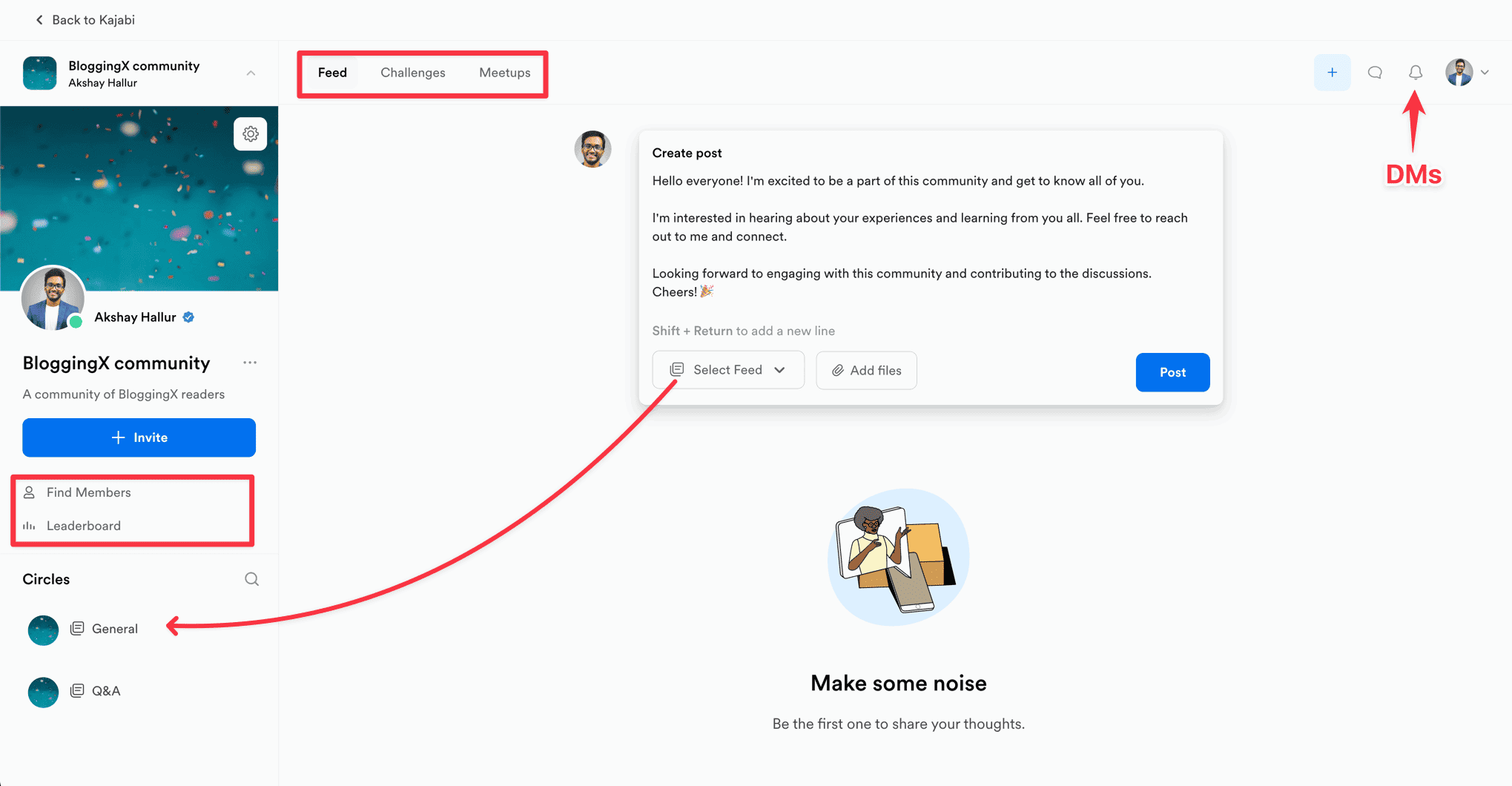
After logging in to the community, your students will see three main tabs: Feeds, Challenges, and Meetups.
I appreciate how intuitively these tabs are set up.
- Feed: Allows people to interact with other community members in an organized way.
- Challenges: Takes care of accountability mechanisms and gamifies the entire process. It has has challenges, accomplishments, live meetups, points, badges, etc. Their acquisition of Vibely allowed them to roll out these features.
- Meetups: Lets you schedule meetings and meetups to develop deeper relationships with the community members.
It also comes with additional features like:
- Newsfeed, chats, and DMs
- Live video calls
- Accountability tools and progress tracking
- Challenges
- Resources
- Events and RSVPs
- Admins
- Member directory and leaderboard
- Etc
One really unique feature of Kajabi is its ability to implement gamification through the use of points and badges, which incentivizes members to take specific actions within your community.
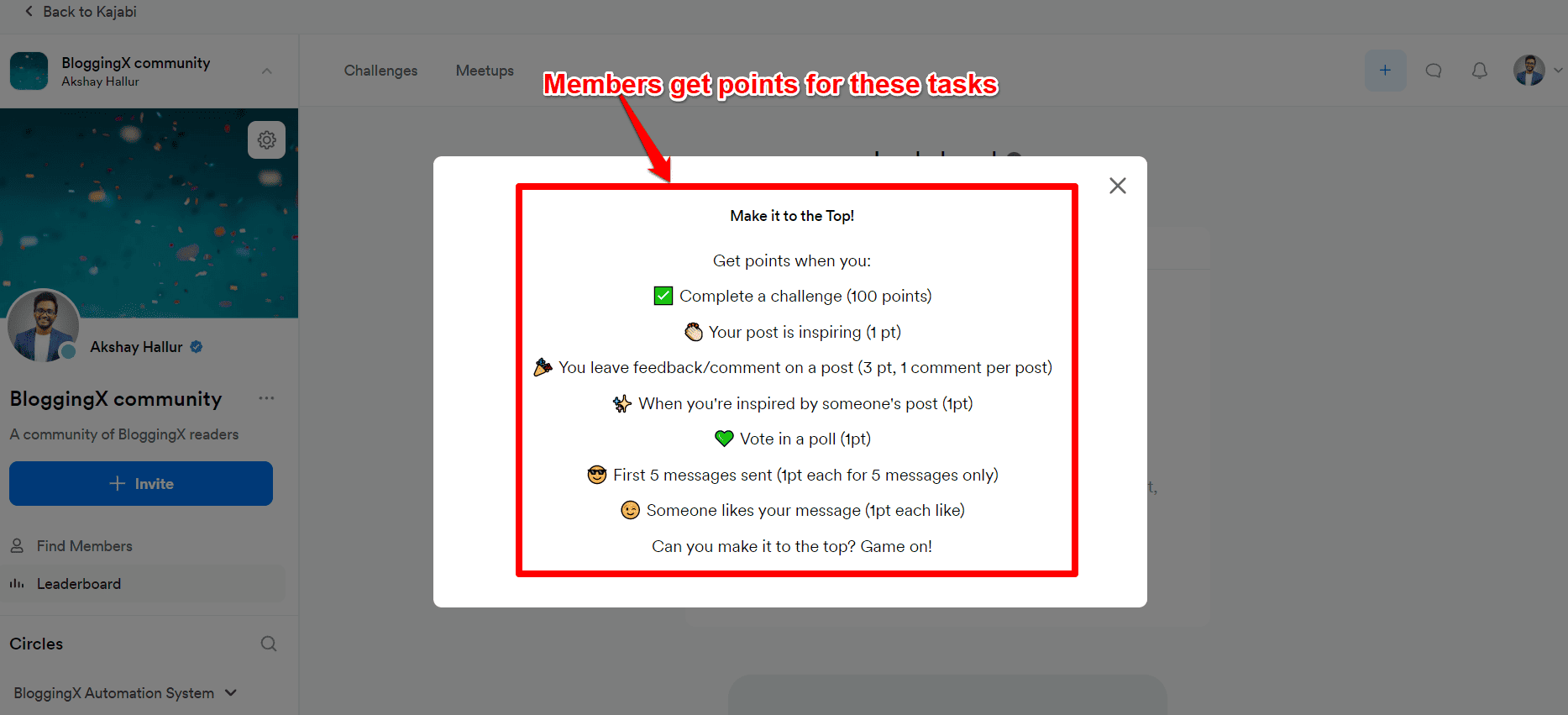
You can also assign points that students can earn based on predefined rules, Kajabi’s community features offer a comprehensive and engaging experience.
When it comes to pricing, Kajabi offers all their features in all the plans.
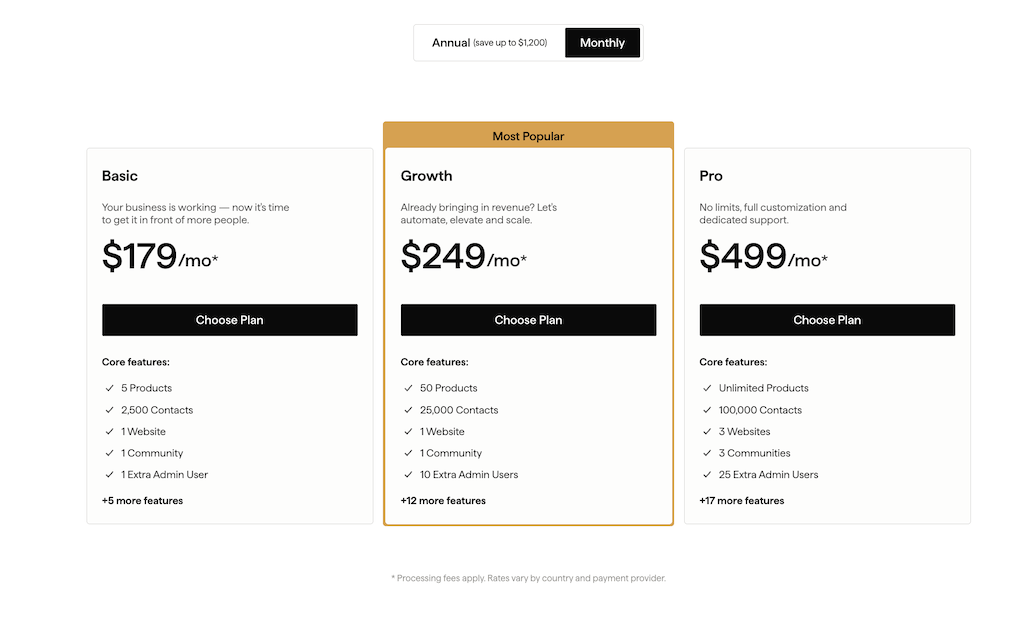
However, their Basic plan, even at $179/mo, comes with the ability for you to create only 5 products.
For most of the people they will be going with the Growth Plan at $249/mo.
I’ve been using this platform from the last 3 years and if you are interested in reading a more comprehensive review, please do refer this review on Kajabi.
👉 Bottom line: Kajabi gives you everything in one place – courses, communities, automation, and email marketing. It’s pricier than most alternatives, but you won’t need to juggle multiple tools or deal with clunky integrations.
Heartbeat – Affordable alternative

Heartbeat is a block-based community building tool similar to Circle. You can host chats, live events, content, and courses under your own custom domain name.
It has almost all the features that Circle offers, and more recently they even rolled out Automation Workflows similar to Circle’s, which allow you to set automation rules and perform bulk actions to improve community engagement and simplify managing larger communities.
One really unique feature that I like about Heartbeat is its integration with Notion, which allows you to sync your Notion pages to Heartbeat. This can be really helpful for streamlining resource management right within Notion.
Their Starter plan at $49/mo only supports up to 1000 members, which would be more than sufficient when starting up.
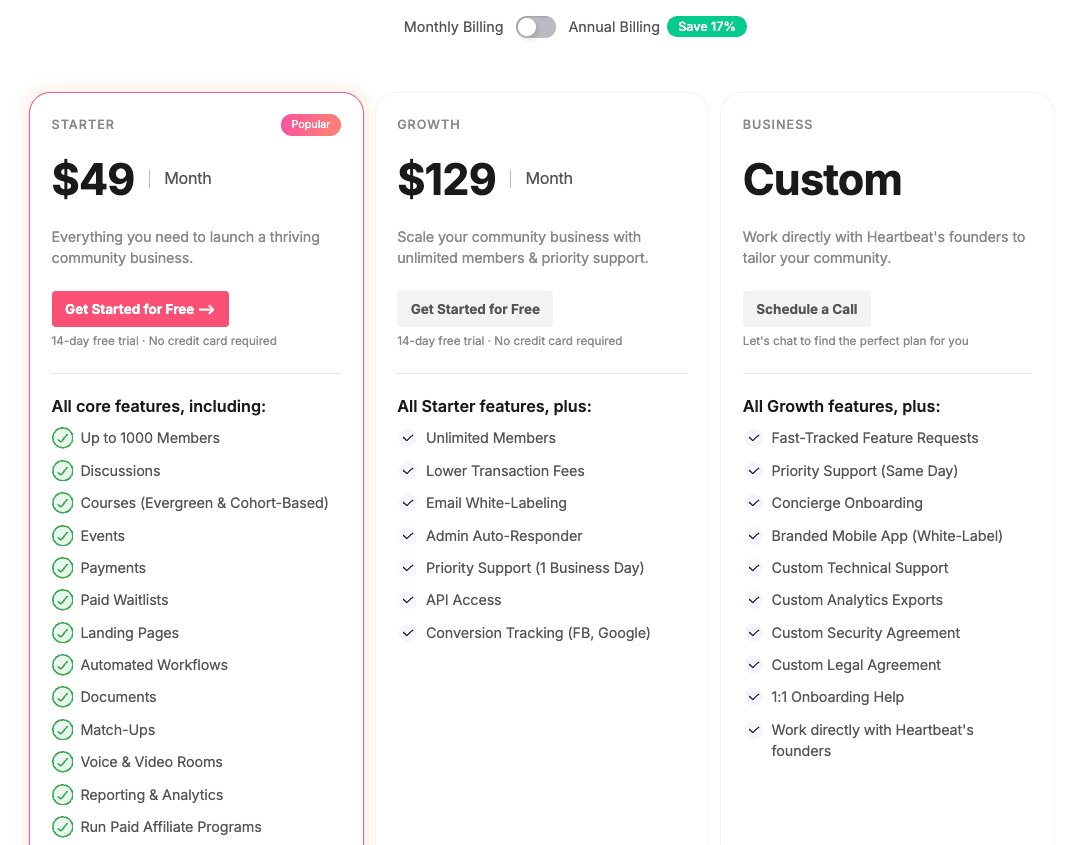
If you exceed the 1000 member mark, you need to go with their Growth plan at $129/mo, which makes sense.
Pros 👍
- Customizable interface: Block-based community building that lets you design flexibly.
- Pricing advantage: Gives you more value for your money than Circle.
- Rich communication options: Voice rooms (think Clubhouse) and video spaces for better engagement!
- Advanced automation: Workflows and Bulk Actions just like Circle for managing your community without the hassle!
- Notion integration: Sync directly with Notion to manage your course resources easily.
- Mobile experience: Native iOS and Android apps that keep students engaged on the go.
- Community networking: Match-ups feature connects members (like Tinder for communities).
Cons 👎
- Market presence: It’s newer and not as popular yet. Many people haven’t heard about it compared to other platforms.
- May be overkill for small groups: If your community is tiny or has simple needs, you’ll end up paying for tools you won’t use. Simpler options might work just fine for basic communities.
- Learning curve: The platform has lots of features. This means you’ll need time to figure out how everything works, especially if you’re new to online communities or switching from a simpler tool.
- Transaction fees on payments: Unlike Thinkific or Kajabi, Heartbeat charges transaction fees. This cuts into your profits when you’re just starting out with a smaller creator business.
👉 Bottom line: Heartbeat gives you better value than Circle. It’s loaded with features like automation workflows and Notion integration, but you’ll need some time to get comfortable with the platform and keep an eye on those transaction fees.
Passion.io – Best for coaches

Passion.io is an LMS app building platform that allows you to create a mobile-first coaching experience for your students.
It is best suited for result-oriented coaches, such as fitness or mindfulness trainers, who want to create custom mobile apps with features like challenges, progress tracking, and motion-based exercises to prioritize student engagement and proactive transformation.
When you first log into their tool, you’ll see the main screen where you have various building blocks to use in building your app live on their app builder.
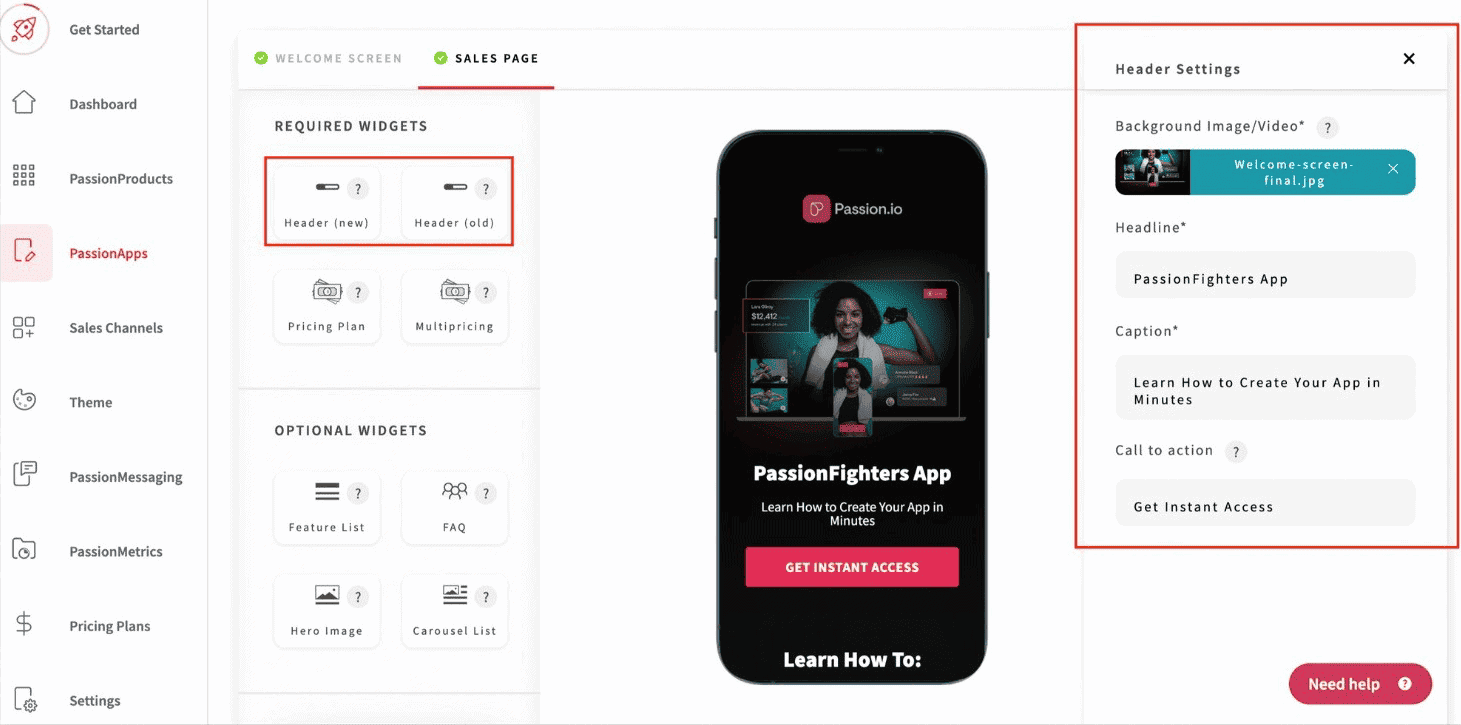
There are also various widgets available for you to use within each lesson:
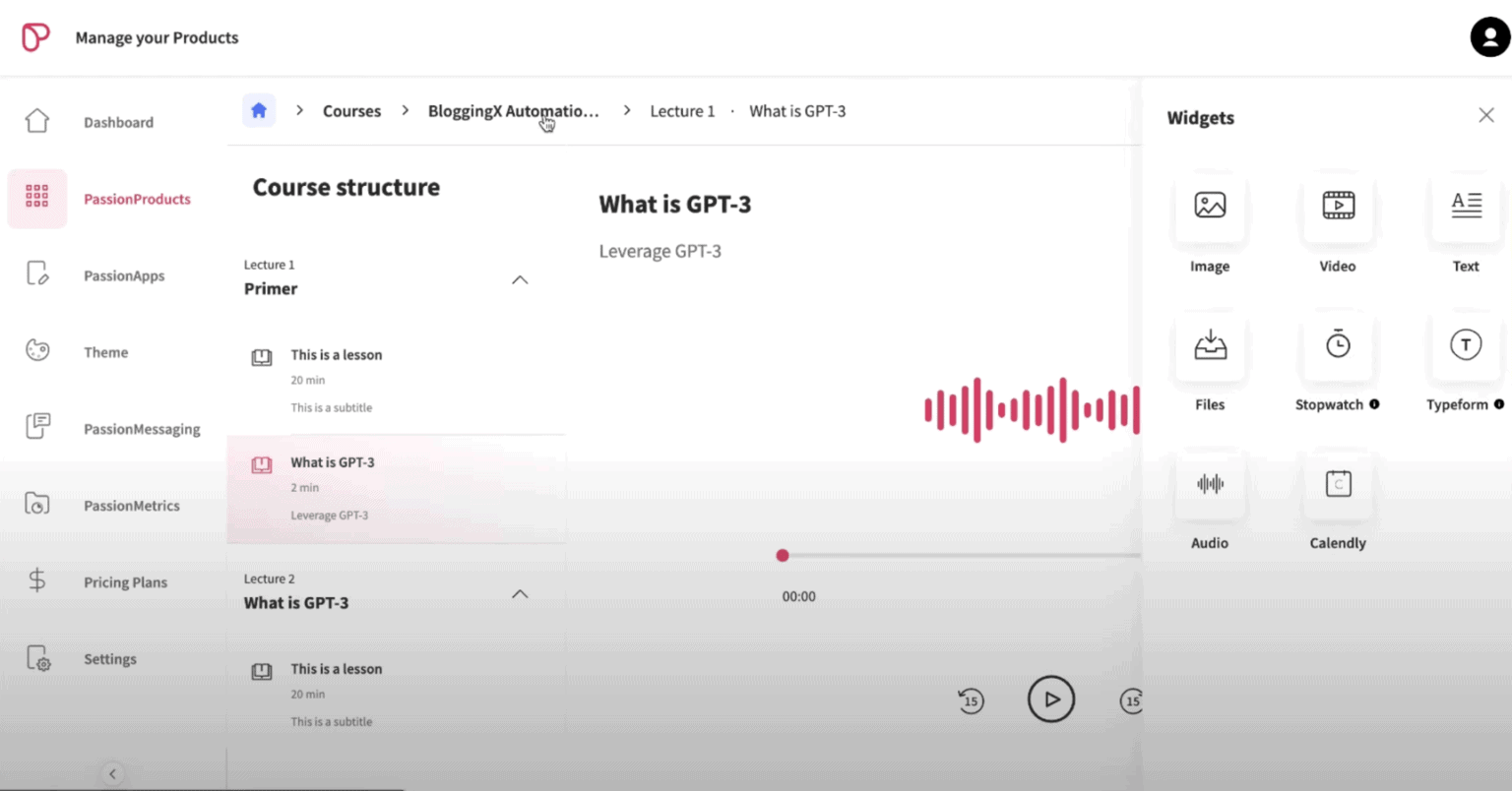
Here are some unique blocks:
- Stopwatch: You can implement timed exercises using the stopwatch widget within each lesson.
- Typeform integration: You can integrate Typeform to mandate students to fill out a form to mark a lesson as complete.
- Calendly integration: Students can schedule consultations right within the app using the native integration with Calendly.
Unlike other platforms, Passion targets a specific micro-niche and is more focused on transformational coaches, particularly in the fitness niche.
However, it lacks many advanced course and community management functionalities found in other apps that have been reviewed so far.
The pricing is also on the premium side, starting at $119/mo (for hosting up to 250 subscribers) and going up to $699 per month (for unlimited members)
Interested in reading a complete hands-on review on Passion? Do refer this review blog post.
👉 Bottom line: If you’re a transformational coach (especially in fitness) who wants a mobile-first app with progress tracking and motion-based exercises, Passion.io works well. But it’s pricey and lacks the advanced community features you’ll find in other platforms.
Podia – Affordable all-in-one platform

Podia (review) is an all-in-one digital platform (similar to Kajabi) to sell various products like courses, communities, memberships, coachings, webinars, etc.
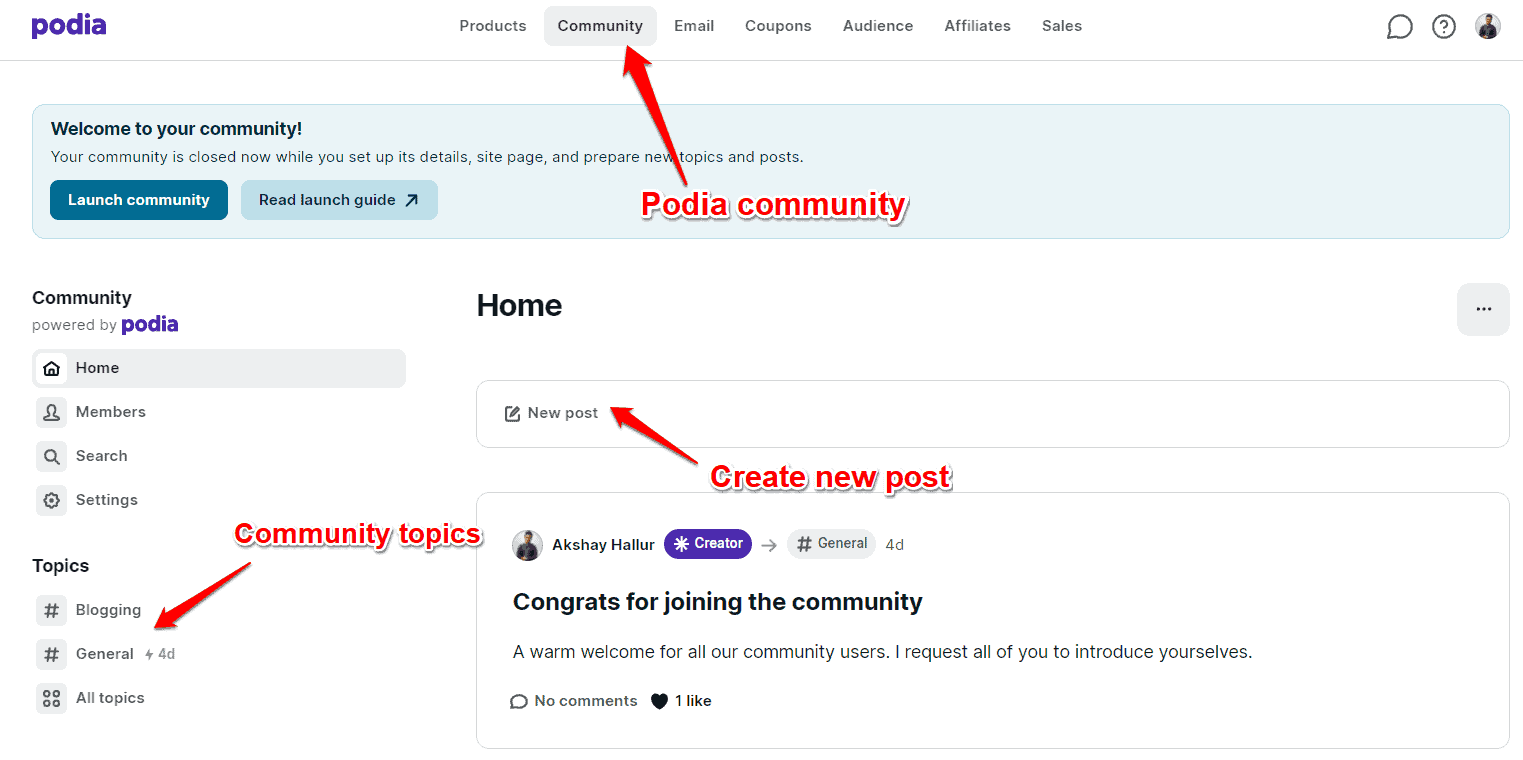
When creating a community, you need to create various Topics (Spaces). And under each of these topics, community members can create posts and interact with the rest of the community members.
However, at present, Podia focuses 70% on courses, marketing, and digital products, and 30% on communities. It lacks a lot of community features found in other apps that I’ve reviewed so far.
According to their roadmap, they plan to introduce several community-related features in the upcoming months to compete effectively with platforms like Mighty Networks and Circle.so.
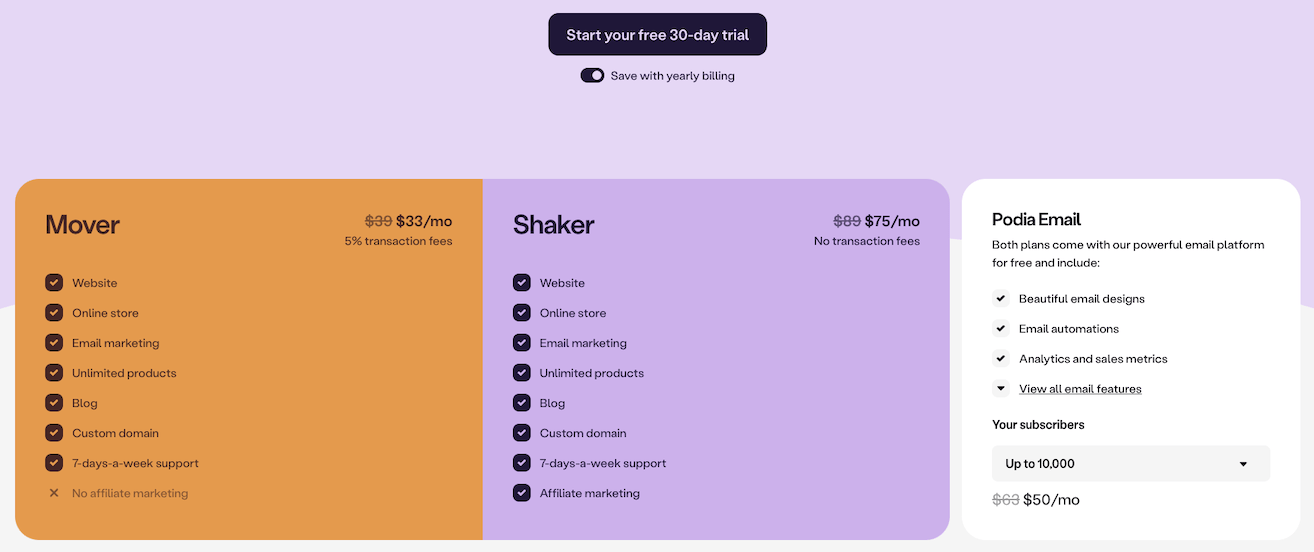
Podia’s pricing starts at $39/mo. It supports unlimited products on all its plans.
You can consider this as an affordable alternative to Kajabi. Although similar to Kajabi, it is an all-in-one platform, it lacks depth to most of its features.
👉 Bottom line: Podia gives you an affordable all-in-one platform for courses and digital products, but its community features are basic. If you need robust community tools now, look elsewhere. If you can wait, check their roadmap for upcoming improvements.
Thinkific

Thinkific (read my review post) is an advanced LMS platform that also comes with communities feature.
Unlike other platforms that I have reviewed in the blog post, Thinkific’s community feature is not so feature-rich.
Inside the community, you can create multiple spaces. Those can also be treated as discussion topics and under them, people can post content and engage with other community members. There’s nothing much more to this.

You can sell communities as a standalone product or as an add-on to your courses.
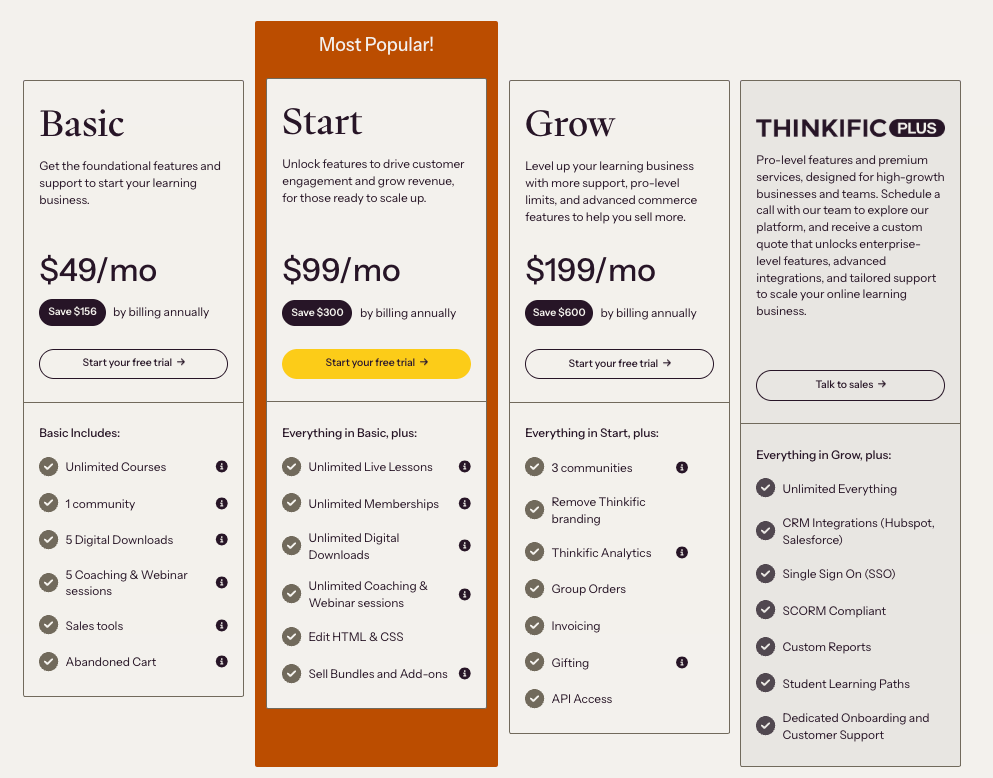
Depending on the pricing plans, Thinkific restricts the number of communities and the spaces you can create.
👉 Bottom line: Thinkific works well for selling courses, but its community features are pretty basic. If you need robust community tools, pair it with Circle or look at more community-focused alternatives instead.
Teachable

Teachable (review) is one of the top LMS platforms for course creators and coaches. But it lacks communities.
You can host your courses and coaching programs on Teachable, while using Circle to host your communities.
Teachable officially recommends Circle for building communities, as its employees have prior experience with Teachable and understand the importance of building LMS-oriented communities. This experience has greatly aided in the development of Circle.so.
To host Circle’s communities on Teachable, you can utilize its embed widgets or share community links within your courses.
Discord

Discord is a voice, video, and text chat app popular among gamers and techies. You can create custom VIP voice channels for your server members and keep conversations organized.
You can also create custom roles, giving users different levels of access to various features in the channel. For a more immersive experience, you can even create your bots and have them integrated with the server. Discord has powerful moderation tools that allow admins and moderators to keep the servers free of spammers.
Discord is perfectly suited for very large communities.
If your audience is more professional, you’d be better off with Slack.
People tend to go with Discord or Slack when they feel:
- Mighty Networks or Circle.so is too much for them
- They need a free solution
- They need an app that’s mobile-centric and very refined with very low friction for users to jump in! (chances are there your audience are already using Discord)
The engagement with Discord will be super high. But isolating signal from the noise will be a challenge of its own.
Slack

Slack is a team collaboration software you can use to host all your conversations in one place.
It has chats, direct messages, screen sharing, cloud uploading (Google Drive and Dropbox), video & voice calling features. For quick meetings, it has Huddle, which eliminates the need for apps like Zoom.
It has another feature called Slack Connect, which you can use to connect with members outside your organization.
It’s a platform more suitable for teams inside an organization. But, there are many solid communities built in Slack.
Some people in some niches go with Slack (instead of, say Discord) due to the fact that Slack’s environment is based on meaningful discussions and not entertainment.
Discourse

Discourse is an exceptional platform that offers free, open-source software for hosting online communities. With its versatile functionality, you can utilize Discourse as a dynamic channel, lively chat room, interactive group, vibrant space, or engaging forum.
Renowned brands like Atlassian, Asana, Zoom, Invanto, and Brave have all chosen Discourse to host their public communities. Unlike other platforms such as Circle.so, Discourse does not impose limitations on the number of members you can welcome into your community.
To ensure a secure and spam-free environment, Discourse provides robust features such as two-factor authentication and integrated spam-blocking through Akismet. These measures guarantee a safe and enjoyable experience for all community members.
In addition to its core features, Discourse offers a wide range of plugins that open new possibilities for customization and enhancement.
For instance, you can leverage its Patreon integration to reward your customers and conveniently collect online payments.
HiveBrite

HiveBrite is a cloud platform you can use to create SaaS communities, product ideation & feedback channels, host your knowledge base, and much more.
With its easy-to-use dashboard, you’ll be able to quickly view all your customers’ comments and ratings to make informed decisions about your products and services.
Plus, its comprehensive analytics will allow you to identify trends and patterns in customer feedback so that you can make the necessary changes to ensure a better user experience.
Additionally, HiveBrite is completely customizable, so you can tailor it to fit your business’s needs. And with its intuitive dashboard, you’ll be able to create customer surveys and polls. With all these features, HiveBrite is the perfect solution for gaining valuable customer insights.
Facebook Groups
Facebook Groups are great for building a community to bring people with similar interests together and share their ideas. Unlike other paid tools, you have less control over your group. You can access just a few group settings. Users can receive notifications for new posts and videos.
The major downside of Facebook Groups is the distraction. Its news feed, algorithm, ads, and notifications distract the users resulting in poor engagement.
Conclusion
Our top 3 Mighty Networks alternatives are Circle.so, Kajabi and Heartbeat.
- If custom-branded mobile apps are unnecessary for you, you can consider Circle.so. It is releasing good features and makes the tool more powerful. Its spaces, courses, live spaces, and live streaming helps you in providing more value to the audience. Moreover, it’s backed by founding members of Teachable!
- If you are a course creator, teacher, or coach looking for a powerful LMS platform with integrated email marketing abilities, Kajabi is the best bet. It has excellment marketing features and also, it has mobile apps for both users and creators.
- Choose Heartbeat if you need more control over your community with a block-based design approach. Its native integration with Notion opens the door for new creative use-cases.
I hope you found this post on Mighty Networks alternatives helpful.






